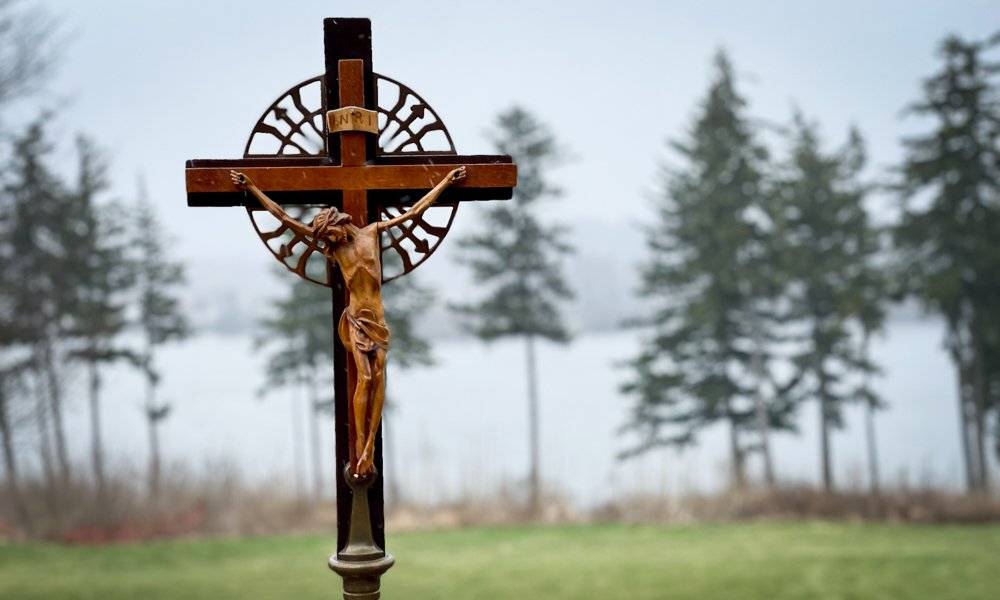
Good Friday was no ordinary day, for it witnessed no ordinary death, but the death of the Son of God incarnate in our place.
By the Rev. Dr. Jason Soenksen
Professor of Theology, Concordia University Wisconsin
What distinguishes one day from another?
We have our appointments and routines. We may prefer one day over another. Friday may bring a sense of relief, an aurora of particular goodness, reminding us that the weekend lies before us and that we may find rest. But sometimes our days all seem alike. As Solomon once wrote, “What has been is what will be, and what has been done is what will be done, and there is nothing new under the sun” (Eccl 1:9).
For the Roman soldiers who crucified Jesus, the day was proceeding much like many others. They had become accustomed to their gruesome duties, callous to the suffering of the condemned. While the crucified were suffocating and dying in anguish, the soldiers gambled for the clothing of Jesus as if he were already dead.
But Good Friday was not just another day. There was something new there under the sun. The Son of God had become also the Son of Man, and made His dwelling among us in His conception through the Holy Spirit of the Virgin Mary. The purpose of His incarnation, the mission of His entire life, hung upon His hours on the cross on that day, Good Friday.
Good Friday was the day for us, for Jesus became man for us and for our salvation. Good Friday was the day long foretold by the prophets, the day of the Lord, a day of darkness and gloom, without any brightness (Amos 5:20; Mt 27:45). The Lord had set a day in which He would judge sinful mankind, for all of us are under the condemnation of the Law, deserving God’s wrath and damnation (Rom 6:23).
Eternal implications
Yet on that day, the Lord would judge His own Son, reckoning to Him the sins of all of Adam’s children. The Last Day of judgment and its dread sentence for sinners fell upon Jesus on Good Friday. He experienced the hell that our sins deserve as He cried out “My God, My God, why have you forsaken me?” (Ps 22:1; Mt 27:46). The punishment that brought us peace with God (Is 53:5), the once-for-all sacrifice for our sins to reconcile us to the Father (Rom 5:10), was accomplished on Good Friday.
Good Friday was not the beginning of rest for Jesus, but His most strenuous and important work, the purpose of His life for us. But through that day, we find rest in Jesus. The cry “It is finished” (Ps 22:21; Jn 19:30) echoes across time, through our life, and beyond the end of time. The suffering Servant fulfilled on Good Friday all that was necessary for our salvation (Heb 10:14).
Because of Good Friday, we are no longer under the cloud of judgment, fearing the justice we must face on the Last Day. The punishment we deserve has already fallen upon Jesus on Good Friday. In Jesus, the crucified, we have rest for our souls every day (Mt 11:28) and the promise of greater and fuller rest yet to come (Heb 4:8). On Good Friday, Jesus made a way for us to enter the presence of God with boldness and confidence (Heb 10:19—20), calling God our dear Father and trusting that for the sake of Jesus the Father regards us as His dear children.
Good Friday was no ordinary day, for it witnessed no ordinary death, but the death of the Son of God incarnate in our place. The death of our Savior is life giving, and sanctifies every day of our lives. Every day for us is like another, for all our days and all our ways have been covered by the blood of the Lamb shed on Good Friday. Blessed are we whose transgressions are forgiven and whose sins are covered (Ps 32:1).
For more information about theology programs at Concordia University Ann Arbor, visit the Department of Theology at cuaa.edu.
—
If this story has inspired you, why not explore how you can help further Concordia's mission through giving.